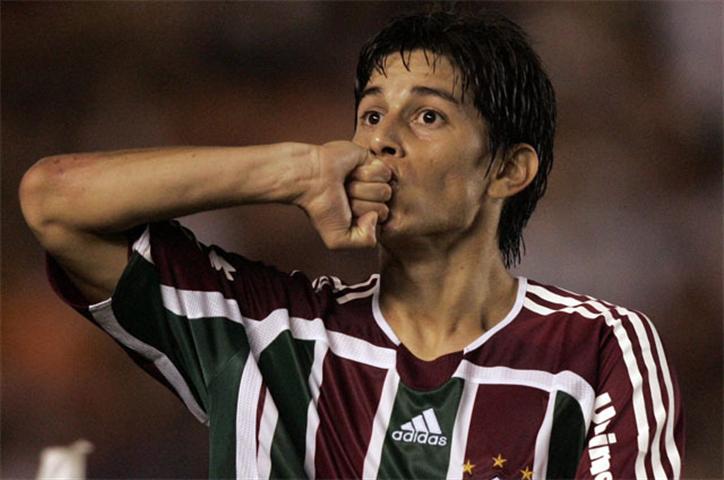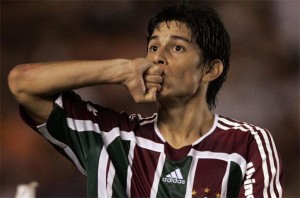Only a handful of well-known foreign players have appeared in the Chinese top league since pro football was launched in 1994. But in the last few years, Chinese Super League clubs had almost exclusively turned to importing complete unknowns, as opposed to the odd Carsten Jancker, Hamilton Ricard, or Jorg Albertz. Indeed, during a Pub Talk back in June, mused over when would a Chinese Super League club next sign a player anyone had heard of, concluding that it would not be anytime soon. However, that all changed with the arrival of Dario Conca in the summer, who, whilst not a huge name himself, is a two-time Brazillian league player of the year who subsequently paved the way for a bona-fide soocer star to arrive – Nicolas Anelka. Part one of this feature, originally written by for goal.com after Guangzhou sealed the Chinese Super League championship, shows how we predicted the arrival of the likes of Anelka, and how the influx of big money is leading to a resurgence in popularity for the Chinese Super League. Read part two of this feature here.
Guangzhou Evergrande clinched their first ever Chinese Super League (Chinese Super League) title back in September with a handsome 4-1 victory over Shaanxi Chanba, as their nearest challengers Beijing Guoan drew 1-1 away to Shandong Luneng.
Winning their maiden championship completed a whirlwind two-year period for the southern club. Relegated from the Chinese Super League in 2009 for their part in a match-fixing scandal three years earlier, they were taken over by real estate company Evergrande in early 2010 and they invested heavily in the playing squad to try and get the team back into the top league at the first attempt.
The club caught the attention of Chinese football by signing top players such as ex-Charlton and Celtic midfielder Zheng Zhi and his China international team-mates Gao Lin and Sun Xiang. As a result, Guangzhou came straight back up, boosted by the mid-season purchase of Brazilian striker Muriqui from Atlético Mineiro for a club record fee of €2.6 million.
Evergrande then moved their spending up a gear, signing another Brazilian striker, Cleo, from Partizan Belgrade for approximately $5m, before bursting the bank in the mid-season with their sensational capture of Brazilian League Player of the Year, Fluminense playmaker Dario Conca, for $10m.
With such an array of talent at their disposal, and led by former Beijing Guoan coach Lee Jang-Soo, Guangzhou have become the first newly-promoted team to win the Chinese Super League, and the sixth different team to become the Chinese domestic champion since the league was re-launched in 2004.
But what exactly does all this mean for Chinese football? Frankly, Guangzhou winning the league after such heavy investment is hugely significant for the game in China and, to an extent, Asia.
Firstly, it proves to the outside what everyone inside Chinese football already knows: the potential of the game in the Middle Kingdom is massive. Despite Chinese football’s well-documented problems, Guangzhou’s crowds have swelled to an average of around 50,000 this season. Few, if any, clubs in the entire continent can match that.
Guangzhou have also set the bar in terms of the quality of foreigners coming to China. For the last five years or so, the standard of player has in most cases been journeymen at best. But with the arrival of such quality names as Argentine attacker Conca, other clubs now know they need to up their game in order to attract better players to compete with Guangzhou. And this year’s Chinese Super League champions are also doing the league as a whole a favour – purchasing the likes of Conca raises the profile of the league and makes it easier for all clubs to attract better players.
It won’t be until next year though that we can get a clearer indication of Guangzhou’s impact on the Chinese Super League. It’s inevitable that at least some of the other big clubs, such as Beijing Guoan, Dalian Shide, Shandong Luneng and Shanghai Shenhua, will attract investment from somewhere to at least enter the same financial playing field as Guangzhou, if not match them, so expect more high-quality players, in their prime, coming to play in China.
But it’s in Asia where Guanghzou face their biggest test, and its where they can also create the biggest impact. The Asian Champions League (ACL) has been slowly developing into a competition taken seriously by the continent’s best teams, since its reformation in 2008 into a group tournament based on the Uefa Champions League format. It’s also a competition that China takes seriously, if attendance figures for matches are anything to go by – Shanghai Shenhua’s highest attended match this season was against Kashima Antlers in the group stage of the ACL.
With such a national focus on gaining respect on the regional stage, Guangzhou can help boost the revitalization of Chinese football even further if they find success in Asia. But ultimately, with the ‘3+1’ foreigner rule, stipulating that each side competing in the Chinese Super League or ACL can only field four foreigners, one of whom must be from an Asian country, Guangzhou will ultimately be restricted by the quality of domestic players they can sign. It’s the proverbial chicken and egg situation, but if Guangzhou can hatch a plan to claim victory in next season’s ACL, then it might just be the start of a brand new chapter in both Chinese and Asian football.


Spot on, although I would argue that Muruiqui looks a better player than Conca.
So far certainly looks that way, backs up Bcheng’s point that you don’t have to spend THAT big to get players who are good enough to make a big difference to a CSL team.